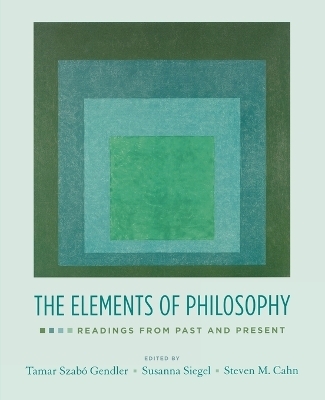
The Elements of Philosophy
Oxford University Press Inc (Verlag)
978-0-19-533542-2 (ISBN)
Preface:
Note to the Reader:
Note to the Instructor:
Acknowledgments:
About the Editors:
INTRODUCTION
What Is Philosophy?: Simon Blackburn
The Elements of Logic: Simon Blackburn
I. RELIGION AND BELIEF
Introduction
A. TRADITIONAL ARGUMENTS FOR AND AGAINST THE EXISTENCE OF GOD
The Ontological Argument--and Replies
The Ontological Argument: Saint Anselm
In Behalf of the Fool: Gaunilo
Is Existence a Predicate?: G.E. Moore
Why the Ontological Argument Fails: William Rowe
The Cosmological Argument, the Argument from Design--and Replies
The Cosmological Argument: Richard Taylor
The Argument from Design: William Paley
Does God Exist?: Ernest Nagel
The Problem of Evil--and Replies
The Problem of Evil: John Hick
The Problem of Goodness: Steven M. Cahn
B. GROUNDS FOR BELIEF
The Wager: Blaise Pascal
The Ethics of Belief: W.K. Clifford
The Will to Believe: William James
The Hiddenness of God: Robert McKim
C. GOD AND SCIENCE: CONTEMPORARY DISCUSSIONS
Theism and Modern Science: Nicholas Everitt
II. MORAL AND POLITICAL PHILOSOPHY
MORAL PHILOSOPHY
Introduction
A. THREE MAJOR ETHICAL THEORIES
Utilitarianism
John Stuart Mill, Selections from Utilitarianism
Extreme and Restricted Utilitarianism: J.J.C. Smart
Utilitarianism, Integrity and Responsibility: Bernard Williams
Deontology
Immanuel Kant, Selections from Grounding for the Metaphysics of Morals
A Simplified Account of Kant's Ethics: Onora O'Neill
Virtue Ethics
Aristotle, Selections from the Nicomachean Ethics
Normative Virtue Ethics: Rosalind Hursthouse
B. SOME APPLICATIONS
Moral Duties to the Poor
Rich and Poor: Peter Singer
Lifeboat Ethics: The Case Against Helping the Poor: Garrett Hardin
"Aiding" the Global Poor: Thomas W. Pogge
Vegetarianism and Animals
Puppies, Pigs, and People: Eating Meat and Marginal Cases: Alastair Norcross
A Critique of the Alleged Moral Basis of Vegetarianism: Carl Cohen
C. PUZZLES AND CHALLENGES
Puzzling Cases
The Trolley Problem: Judith Jarvis Thomson
Moral Luck: Thomas Nagel
The Value of Morality
Plato, "Glaucon's Challenge" from The Republic
Moral Saints: Susan Wolf
The Universality of Morality
Egoism and Moral Skepticism: James Rachels
The Challenge of Cultural Relativism: James Rachels
Morality and Social Science
Women's "Different Voice": Jennifer Saul
Morality and Heuristics: Cass R. Sunstein
POLITICAL PHILOSOPHY
Introduction
D. JUSTICE, EQUALITY, AND THE STATE
Thomas Hobbes, "Contract and Commonwealth" from Leviathan
John Rawls, "Justice as Fairness" from A Theory of Justice
Robert Nozick, "Distributive Justice" from Anarchy, State and Utopia
E. JUST WAR
Conventions and the Morality of War: George I. Mavrodes
War and Innocence: Robert K. Fullinwider
Self-Defense and the Killing of Non-Combatants: A Reply to Fullinwider: Lawrence A. Alexander
III. METAPHYSICS AND EPISTEMOLOGY
KNOWLEDGE AND REALITY
Introduction
A. DEFINING "KNOWLEDGE"
Plato, "What is Knowledge?" from The Meno
Is Justified True Belief Knowledge?: Edmund Gettier
Robert Nozick, "Knowledge" from Philosophical Explanations
B. SKEPTICISM AND RESPONSES
Meditations 1 and 2: René Descartes
Proof of an External World: G.E. Moore
Certainty: G.E. Moore
Robert Nozick, "Skepticism" from Philosophical Explanations
Cartesian Skepticism and Inference to the Best Explanation: Jonathan Vogel
C. KNOWLEDGE AND THE NATURE OF REALITY
Plato, "The Allegory of the Cave" from The Republic
George Berkeley, Selections from Of the Principles of Human Knowledge
Posits and Reality: W.V.O. Quine
Brains in a Vat: Hilary Putnam
The Matrix as Metaphysics: David J. Chalmers
Fiction: Robert Nozick
D. INDUCTION
David Hume, "Induction" from An Enquiry Concerning Human Understanding
Wesley Salmon, Selections from The Problem of Induction
The New Riddle of Induction: Nelson Goodman
METAPHYSICAL PERPLEXITIES
Introduction
E. TIME AND TIME TRAVEL
Time and the Relativity of Simultaneity: Albert Einstein
Time: Theodore Sider
The Paradoxes of Time Travel: David Lewis
F. FREE WILL
Freedom and Necessity: A.J. Ayer
Human Freedom and the Self: Roderick M. Chisholm
Freedom of the Will and the Concept of a Person: Harry Frankfurt
Freedom and Resentment: Peter Strawson
G. IDENTITY AND PERSONAL IDENTITY
John Locke, "Of Identity and Diversity" from An Essay Concerning Human Understanding
The Self and the Future: Bernard Williams
Derek Parfit, "Personal Identity" from Reasons and Persons
IV. PHILOSOPHY OF MIND AND LANGUAGE
MIND
Introduction
A. METAPHYSICS OF MIND
Dualism and Behaviorism
Sixth Meditation: René Descartes
Understanding Nyaya-Vaisesika Dualism: Kisor Kumar Chakrabarti
Descartes' Myth: Gilbert Ryle
Physicalism
Physicalism: Daniel Stoljar
Sensations and Brain Processes: J.J.C. Smart
Eliminative Materialism and the Propositional Attitudes: Paul M. Churchland
Challenges to Physicalism
Saul Kripke, The Modal Argument
The Knowledge Argument: Frank Jackson
B. CONSCIOUSNESS AND PERCEPTION
Consciousness
What Is It Like to Be a Bat?: Thomas Nagel
Quining Qualia: Daniel C. Dennett
Concepts of Consciousness: Ned Block
Minds and Machines
Computing Machinery and Intelligence: A.M. Turing
Can Computers Think?: John Searle
Perception
Reasoning About Our Experience: J.J. Valberg
The Argument from Illusion: A Defense of Sense Data: A.J. Ayer
The Argument from Illusion: A Critique of Sense Data: J.L. Austin
LANGUAGE
Introduction
C. LANGUAGE, MEANING, AND REFERENCE
Logic and Conversation: H.P. Grice
Language and Problems of Knowledge: Noam Chomsky
The Problem of the Essential Indexical: John Perry
V. LIFE AND DEATH
Introduction
A. LIFE
Plato, "On the Harmony of the Soul" from The Republic
Existentialism: Jean-Paul Sartre
What Makes Someone's Life Go Best: Derek Parfit
The Absurd: Thomas Nagel
B. DEATH
Death: Thomas Nagel
Death Without Dread: Walter Kaufmann
Glossary:
Notes:
Resources:
| Erscheint lt. Verlag | 10.1.2008 |
|---|---|
| Zusatzinfo | 22 line illustrations |
| Verlagsort | New York |
| Sprache | englisch |
| Maße | 235 x 191 mm |
| Gewicht | 1252 g |
| Themenwelt | Geisteswissenschaften ► Philosophie ► Ethik |
| Geisteswissenschaften ► Philosophie ► Philosophie Altertum / Antike | |
| Geisteswissenschaften ► Philosophie ► Sprachphilosophie | |
| ISBN-10 | 0-19-533542-2 / 0195335422 |
| ISBN-13 | 978-0-19-533542-2 / 9780195335422 |
| Zustand | Neuware |
| Haben Sie eine Frage zum Produkt? |
aus dem Bereich


